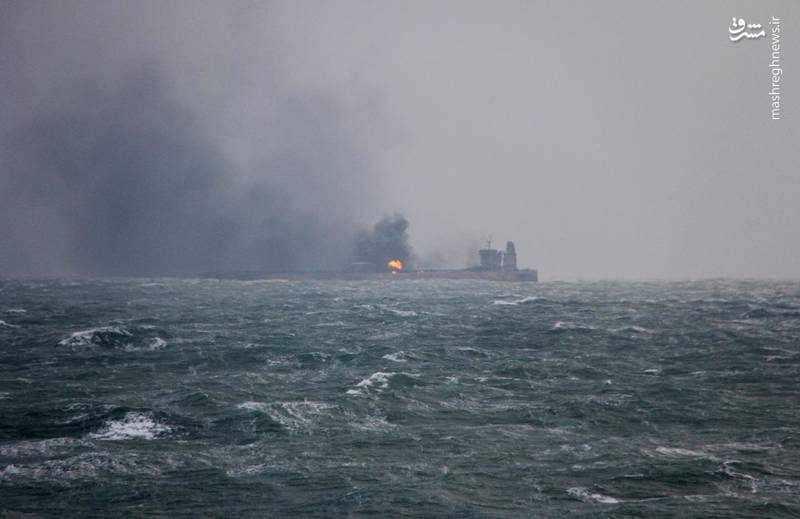The Persian-language Aftab-e-Yazd daily has, in an article, implicitly criticized the Chinese for their handling of a collision incident involving and Iranian oil tanker and a Chinese vessel. The full text of the article follows.
The thirty-one men and one woman on board an Iranian oil tanker that went missing after the vessel collided with a cargo ship off China’s east coast are still unaccounted for. The only thing found so far is a charred body. The saga is the story of Iranian sailors’ loneliness.
The latest reports suggest another country has sent in a relief and rescue team by helicopter from Japan’s Okinawa island to the scene of the accident to join the Iranian, Chinese and Korean rescuers in search operations. Three days into the incident, which happened at the estuary of the Yangtze River in East China Sea, word is going around among top Iranian technical marine experts on the quality of relief and search operations.
Here is what a former official with the National Iranian Tanker Company told Aftab-e-Eqtesadi on condition of anonymity:
“The accident happened 158 kilometers from Shanghai, which is a major oil terminal in the world. That means there are numerous facilities at the Shanghai port, including equipment to unload crude oil and gaseous condensates; so, the necessary equipment and services have been envisioned to deal with marine accidents. At least two fire-fighting vessels, a relief ship equipped with choppers, a large number of trawlers and many marine rescuers are always on alert.”
“In this accident, too, there were reports also confirmed by our colleagues that two Chinese ships arrived at the scene of the accident in two hours. The helicopters, too, arrived at the scene almost immediately. Also, based on the images posted on the global traffic website, which is equipped with satellite systems and connected to ship trackers, at least two Chinese ships changed their course toward the scene of the accident after they received the mayday signal from the Chinese oil tanker. So, the Chinese acted professionally as they arrived at the scene at the appropriate time,” he said.
According to the official, the Chinese managed to rescue the 21 Chinese tanker sailors who were on a lifeboat.
“As you know, given the 1,000-meter oil spill created around the vessels due to the accident, helping the ships in distress would be a risky job,” said the anonymous official.
“Of course, if the choppers kept patrolling in the air, they might have been able to find a trace of the Iranian sailors or their lifeboat during the early golden hours, but it seems the Chinese helicopters did not risk patrolling in the thick smoke lingering in the air near the scene of the accident as there was the possibility of an explosion any moment,” he noted.
“In fact, the two Chinese rescue ships left the area after saving the Chinese sailors, and the fire-fighting ships were apparently dispatched to the location after our ambassador to Beijing called the Foreign Ministry,” the official explained.
“Fog and rainy weather there, the darkness of the night, the oil slick and the fire from the burning flames posed some risks to the rescue operations, which, of course, is normal in any marine incident,” he said.
“Based on the marine protocols also signed by the Chinese government, the countries bordering the international waters where an accident happens have a duty to help the vessel in distress as much as they can,” he noted.
“If the accident had happened in the Persian Gulf, we, too, would have used all we could to help the victims of the incident,” he added.
“The National Iranian Oil Tanker Company and the Ports and Shipping Organization, due to some logical reasons, are not able to officially make comment on the issue, but the reality is that they would not have sent a relief ship to the scent of the accident if they had not been aware of the details of the incident and if they had trusted the Chinese. Given that the lifeboat had been detached from the vessel, and the captain’s phone was still ringing (though no one answered), it seems the sailors had enough time to put on life vests and get onto the lifeboat,” the official noted.
“If the Chinese hadn’t left the site of the accident after saving their fellow countrymen and if they had extended the radius of search operations to at least 10 miles, the hopes of saving our fellow countrymen would have definitely increased,” the official underlined.
In the meantime, the spokesman for the National Iranian Oil Tanker Company said Iran and China are at odds at the moment over the slow operations to douse the flames.
“At the moment, there are differences between us and the Chinese over relief operations, which have slowed down the work,” Mohsen Bahrami told ILNA.
“At the beginning, the Chinese brought up the issue of volatile substances. Now, they speak of a [possible] explosion, which has slowed down work,” he said.
“Now, Japanese companies have become active as well, and we have asked them to help put out the fire. Moreover, we have asked the International Ports and Maritime Organization to make China speed up work,” said the spokesman.
He said it seems the lifeboat has been used by the crew, in which case they can survive for up to two months.
“That the vessel was a Panama-flagged ship has nothing to do with the sanctions and is only because of marketing issues. Anyway, we are operating the ship,” he said.
